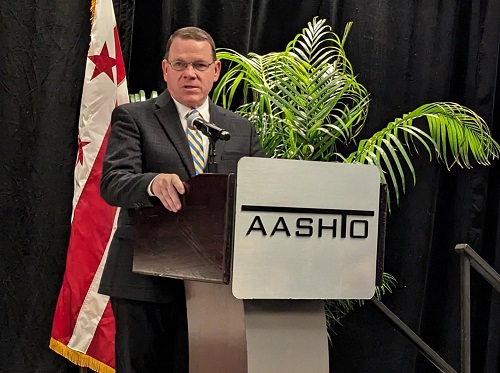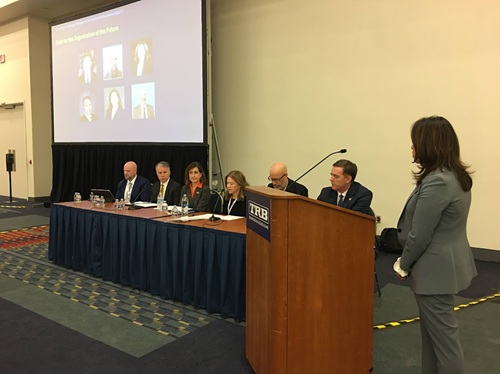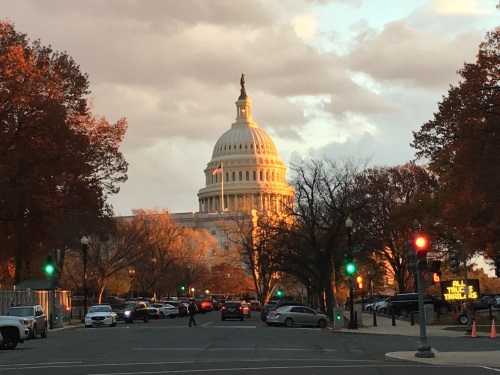On December 18, the U.S. Senate passed the Thomas R. Carper Water Resources Development Act of 2024, or WRDA, by a vote of 97-1. Named after Sen. Tom Carper (D-DE), the outgoing chairman of the Senate Committee on Environment and Public Works, that legislation aims to improve the nation’s ports and harbors, inland waterway navigation, flood and storm protection, and other aspects of the nation’s water resources infrastructure.
[Above photo by AASHTO]
The measure was previously approved by the House on December 10, by a vote of 399 to 18, and now goes to President Biden to be signed into law.

“This legislation … ensures the Army Corps of Engineers can address the diverse water needs of our nation and can work to make our communities more resilient in the face of extreme weather,” noted Sen. Carper in a statement. “It also reauthorizes the Economic Development Administration for the first time in 20 years, updates the federal regional commissions, and increases transparency and accountability at the U.S. Department of Transportation and the General Services Administration.”
“Now that the Senate has passed WRDA, this critical legislation … is on its way to soon becoming law,” added Sen. Shelley Moore Capito (R-WV), the EPW committee’s ranking member.
WRDA is biennial legislation that authorizes the U.S. Army Corps of Engineers’ Civil Works Program. The final version of WRDA followed negotiations over recent months to reconcile House- and Senate-passed versions of the legislation earlier this year.
This is the sixth consecutive Congress that has considered a WRDA bill since 2014 and development of the final legislative packages was spearheaded by House T&I Chair Sam Graves (R-MO), T&I Ranking Member Rick Larsen (D-WA), EPW Chair Carper, and EPW Ranking Member Capito.

“Getting this legislation signed into law means that Congress has maintained the schedule of regularly passing WRDA improvements and reforms every two years,” said Rep. Graves in a separate statement. “WRDA 2024 makes much needed reforms at the U.S. Army Corps of Engineers to streamline processes, reduce cumbersome red tape, and get projects done faster.”
“In the Pacific Northwest and across the country, investments in ports, harbors and inland waterways support good-paying jobs and are key to long-term economic growth, which is why I applaud today’s passage of WRDA,” Rep. Larsen noted in a separate statement. “WRDA 2024 creates good-paying jobs across the country by building on our committee’s bipartisan tradition to improve our nation’s water resources.”
The now-passed WRDA package contains several crucial provisions for state departments of transportation.
According to analysis by the American Association of State Highway and Transportation Officials, the legislation includes the Fiscally Responsible Highway Funding Act of 2024, which makes key changes to the Transportation Infrastructure Finance and Innovation Act or TIFIA that provides loans for major transportation projects.
As a result of that legislative inclusion, the WRDA package transfers $1.8 billion of unused TIFIA funds to the flexible Surface Transportation Block Grant Program or STBGP that supports state and local transportation projects, while also aiming to transfer 75 percent of any future unused amounts from the $250 million provided to TIFIA in each of FY 2025 and FY 2026.
In addition to providing additional STBGP funding that is in high demand throughout the country, this provision will permanently reduce future August Redistribution amounts by $1.8 billion – providing more upfront federal highway dollars to states and relieving pressure at the end of each fiscal year.
AASHTO’s analysis also noted that the WRDA legislation includes key provisions based on several water policy recommendations the organization developed in 2023. They include:
- Increasing the maximum depth for deepening harbor channels from 50 feet to 55 feet with regard to determining the federal cost share both for a construction project and for operations and maintenance dredging projects.
- Increasing General Fund support for inland waterway projects for the costs of construction.
- Supporting beneficial use of dredged materials to facilitate dredging projects and provide key supports for beach nourishment projects and other coastal management needs to drive infrastructure resiliency.
- Calling for the development and implementation of a framework for integrating, sharing, and using water data for the purpose of improving water resources management.
 Top Stories
Top Stories
AASHTO Lays Out Policy Action Agenda for 2026
February 6, 2026 Top Stories
Top Stories

